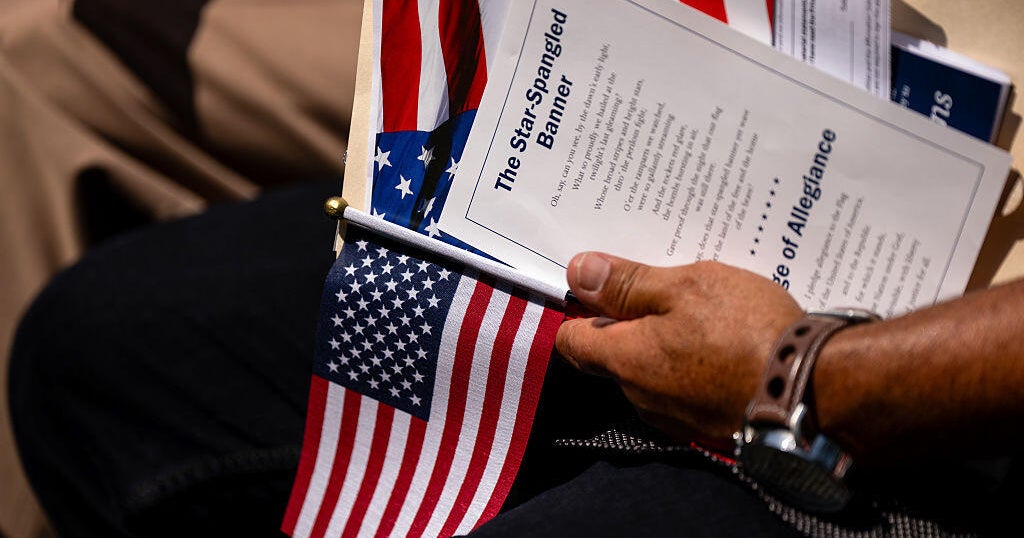To my mind this seems like a great idea.
It adds some subjective components to the citizenship test, which may make an already hard process a little bit harder, but it also, theoretically, means that people approved for citizenship will better fit into society and hold societal values that are compatible with US society. Naturally some of the radicals (HAMAS cos-play kids and other terror lovers) are upset that their moral character will be taken into account.

 www.cbsnews.com
www.cbsnews.com
FULL STORY at the LINK at CBS News ^^^
It adds some subjective components to the citizenship test, which may make an already hard process a little bit harder, but it also, theoretically, means that people approved for citizenship will better fit into society and hold societal values that are compatible with US society. Naturally some of the radicals (HAMAS cos-play kids and other terror lovers) are upset that their moral character will be taken into account.

Trump administration to more heavily scrutinize "good moral character" requirement for U.S. citizenship
U.S. Citizenship and Immigration Services instructed officers on Friday to consider additional factors when determining whether immigrants applying for U.S. citizenship have a "good moral character."
FULL STORY at the LINK at CBS News ^^^
Trump administration to more heavily scrutinize "good moral character" requirement for U.S. citizenship
By
Updated on: August 16, 2025 / 12:28 PM EDT
The Trump administration is signaling it will more heavily scrutinize applications filed by legal immigrants seeking American citizenship, in its latest effort to tighten access to U.S. immigration benefits.
U.S. Citizenship and Immigration Services, the federal agency overseeing the country's legal immigration system, instructed officers on Friday to consider additional factors when determining whether immigrants applying for U.S. citizenship have a "good moral character."
Typically, legal immigrants with U.S. permanent residency, also known as a green card, can apply for naturalized American citizenship after a 3- or 5-year period, depending on their case. Demonstrating "a good moral character" has long been one of the requirements in U.S. immigration law for American citizenship, alongside passing English and civics tests.
For decades, under Republican and Democratic administrations, the "good moral character" assessment has generally been satisfied if applicants don't have any of the criminal offenses or disqualifying conduct outlined in U.S. immigration law. Those disqualifying factors range from violent crimes like murder and aggravated felonies to drug offenses and being a "habitual drunkard."
But a policy issued Friday by USCIS expands the "good moral character" assessment, saying that determination must involve "more than a cursory mechanical review focused on the absence of wrongdoing." Instead, the review, the agency told its officers, should be "a holistic assessment of an alien's behavior, adherence to societal norms, and positive contributions that affirmatively demonstrate good moral character."
The directive orders officers to place a "greater emphasis" on applicants' "positive attributes and contributions," listing community involvement, family caregiving and ties, educational attainment, "stable and lawful" employment, the length of time spent in the U.S., and paying taxes as some of those factors.
The memo also mandates "greater scrutiny" of factors that show applicants lack a "good moral character," beyond the crimes and disqualifying conduct detailed in U.S. immigration law.
Those factors, the policy said, include "acts that are contrary to the average behavior of citizens in the jurisdiction where aliens reside," including actions that are "technically lawful" but also "inconsistent with civic responsibility within the community." USCIS listed "reckless or habitual traffic infractions, or harassment or aggressive solicitation" as some of those actions.
Lastly, the new USCIS policy instructs officers to weigh factors that could show that applicants who have engaged in wrongdoing have rehabilitated, such as complying with probation, paying overdue taxes or child support and receiving letters of support from their community. . . .

